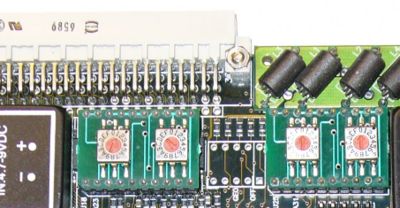Difference between revisions of "CAEN V775 TDC"
(→Header) |
|||
| Line 73: | Line 73: | ||
bits 27-31 contain the GEO address = 11111 d = 0xF | bits 27-31 contain the GEO address = 11111 d = 0xF | ||
| + | |||
bits 26-24 contain the type of word 010 => header | bits 26-24 contain the type of word 010 => header | ||
| + | |||
bits 16-23 contain the crate number = 00000000 => crate 0 | bits 16-23 contain the crate number = 00000000 => crate 0 | ||
| + | |||
bits 8-13 contain the number of channels contained in the data word = 000001 = 1 TDC channel | bits 8-13 contain the number of channels contained in the data word = 000001 = 1 TDC channel | ||
Revision as of 06:49, 30 November 2008
The 12 bit ADC conversion time is 5.7 \mu s. A sliding scale technique is used to reduce differential nonlinearity by injecting an offset. This reduces the dynamic range to 0->3840. The ADC values between 3841 and 4095 indicate an error.
| Address | |
| Pin | Setting |
| SW 1 | 1 |
| SW 2 | 6 |
| SW 3 | 0 |
| SW 4 | 8 |
initialize TDC
-> c775Init(0x610000) Initialized TDC ID 0 at address 0x90610000
Common Start/Stop =
BitSet 2 is used to set the TDC in common start or stop mode.
0 => common start 1 => common start
Use the Status function to see what the bit is set at
-> c775Status(0)
STATUS for TDC id 0 at base address 0x90610000
----------------------------------------------
Interrupts Disabled
Last Interrupt Count : 0
--1-- --2--
Status = 0x0050 0x0002
BitSet = 0x0000 0x0898
Control = 0x0000
FSR = 140 nsec
Event Count = (No Events Taken)
Last Event Read = (No Events Read)
value = 37 = 0x25 = '%'
BitSet 2 is set to 0x0898 = 100010011000 d
The above has bit 10 ( starting from 0 at the very left) set to 0 => common start
Read Data
Use PrintEvent to print out the data in the TDC to the ROC console
-> c775PrintEvent
TDC DATA for Module 0
Header: 0xfa000100 nWords = 1
0xf80048b8
Trailer: 0xfc00005a Event Count = 90
value = 3 = 0x3
Decoding the data
Header
Header = 0xfa000100 = 11111010000000000000000100000000 b
bits 27-31 contain the GEO address = 11111 d = 0xF
bits 26-24 contain the type of word 010 => header
bits 16-23 contain the crate number = 00000000 => crate 0
bits 8-13 contain the number of channels contained in the data word = 000001 = 1 TDC channel
Data Words
data = 0xf80048b8 = 11111000000000000100100010111000 b
bits 27-31 contain the GEO address = 11111 d = 0xF
bits 26-24 contain the type of word 000 => dataum
bits 16-20 contain the channel number = 00000 => channel 0
bit 14 = data valid bit = 1 => valid data
bit 13 = underthreshold bit
bit 12 = overflow bit 0 => ADC not in overflow
bits 0-11 contain the TDC value = 100010111000 b = 0x8b8 = 2232 d
The TDC value for channel 0 is 2232 channels.
The manuals says the TDC has a range from 140 ns to 1.2 \mu s with 8 bit resolution.
The Trailer structure
Trailer: 0xfc00005a Event Count = 90
Measureing the TDC range
I used the Stanford pulse generator to generate 2 NIM pulses and then sent those to a NIM to ECL converter in order to create 2 ECL pulses which the TDC accepts as input.
I set the delays to
A = T+0
B = T+ 60 ns
C = T+ 70 ns
D = T + 130 ns
The TDC data bits were = 010000100001 b = 1057 d
Change the delays on "C" and "D" to:
A = T+0
B = T+ 60 ns
C = T+ 100 ns
D = T + 150 ns
And the TDC bits become = 010111010001 b = 1489 d
Change the delays on "C" and "D" to:
A = T+0
B = T+ 60 ns
C = T+ 150 ns
D = T + 200 ns
TDC bits = 100110010011 b = 2451 d
Change the delays on "C" and "D" to:
A = T+0
B = T+ 60 ns
C = T+ 200 ns
D = T + 250 ns
The TDC can only measure time intervals up to about 250 ns.
For Channel 0 I injected the pulses
Data = 0xf80048b1 = 11111000000000000100100010110001 b
bits 0-11 = 100010110001 b = 2225 d = 0x 8b1

